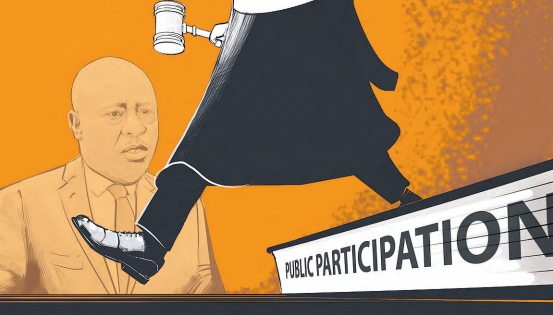
By LEDAMA OLEKINA
What I am about to say may not be popular, but it needs to be stated: the Judiciary has overstepped its authority by insisting on public participation in matters like the impeachment of an allegedly rogue and criminally inclined Deputy President.
The High Court in Kerugoya recently ruled that the National Assembly must collect public views on Rigathi Gachagua’s impeachment across all 290 constituencies, rather than at the county level.
Justice Richard Mwongo made this decision following a petition filed by Muge Law Advocates on behalf of Kirinyaga Woman Representative Jane Njeri Maina.
I wonder if the judge fully considered the implications of his order. Does the spirit of Article 118 of the Constitution, which guarantees public participation, truly mandate what amounts to a mini referendum in this case? We operate in a representative democracy where each constituency elects a member of Parliament.
If this ruling is taken literally, does it mean that for every piece of legislation, whether it’s a Finance Bill or law, such as the proposal to transform the Office of the Registrar of Political Parties into a commission, MPs must halt their legislative duties and return to their constituents for approval?
Is it practical to consult the public on every single matter, or does this interpretation risk paralysing parliamentary work under the guise of public participation?
Don’t get me wrong, I believe that public participation is vital in a democracy, but turning it into a hollow spectacle for airing unrelated grievances and settling petty political scores undermines its purpose.
When misapplied, public participation becomes a distraction rather than a tool for accountability. As the saying goes, when you have a hammer, every problem starts to look like a nail.
For our Judiciary, this seems particularly true regarding public participation. The courts insist on applying this requirement to every issue, even impeachment, where its relevance is questionable and unheard of in other jurisdictions where such processes are handled with the evidentiary requirements and solemnity of a court trial.
Those with a sense of recent history will recall this in action during the impeachments of Presidents Donald Trump in the US and Dilma Rousseff in Brazil.
The Judiciary’s actions have placed an unnecessary burden on governance and undermined the essence of representative democracy. When citizens vote, they entrust their representatives with the authority to make decisions on their behalf.
This is most evident in Parliament’s constitutional authority to impeach, as outlined in Article 150(1)(b). Public participation, as it is currently applied, has become a popularity test at best, and a blunt instrument at worst, one that often produces more heat than light.
This was evident last weekend when members of the public were invited to express their views on Gachagua’s impeachment. Instead of focusing on the charges against the Deputy President, citizens aired grievances on unrelated issues.
If public participation continues to be framed in this chaotic way, it risks derailing critical legislative processes. Worse still, it creates an environment where the Judiciary effectively assumes the role of a super-legislature, thus undermining Parliament’s constitutional mandate.
My position on the matter is crystal clear; Article 118 must be interpreted in a way that is reasonable and mindful of the financial and logistical constraints of the country.
This issue must therefore urgently undergo judicial review before it derails the legislative process and hampers the functioning of Parliament.
Fortunately, the Senate, which will serve as the trial chamber for Gachagua’s impeachment, does not require further public participation. Senators will be able to deliberate on the merits of the case without being drawn into the kind of public spectacle we have seen.
This is how it should be.
Going forward, we must be clear about the limits
of public participation and respect the constitutional
boundaries that separate the Judiciary from the
legislature. If not, we risk letting our good intentions
undermine the effectiveness and maturity of the same
democracy we seek to protect.











